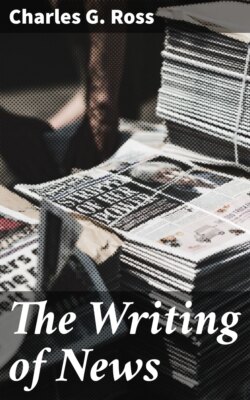Читать книгу The Writing of News - Charles G. Ross - Страница 10
На сайте Литреса книга снята с продажи.
FORCE
ОглавлениеTable of Contents
Force grows out of simplicity, clearness, terseness of style. The story told in plain, curt phrase is more effective than the story which shows a conscious striving after effect. Diction is important. A strong word lends strength to an entire sentence, while a weak word may spoil the vividness of an impression. As a rule the words that are deeply rooted in everyday speech are stronger than their synonyms of foreign origin. Words derived from the Anglo-Saxon are the bone and sinew of the language. The writer who neglects them for the longer and often more euphonious words from the Latin may add elegance to his style, but he takes away from its power to impress. The reader feels the difference, though he may not be able to explain it.
Brevity as well as force favors the Anglo-Saxon. “Begin” is shorter than “commence.” It is a better word for the news writer. Likewise it is better to say “A movement was begun” than “A movement was inaugurated.” The latter is a word in good standing—presidents are inaugurated—but let it be confined to its proper use. “Build” is preferable to “construct” when the words may be used interchangeably. Examples might be multiplied, but in the end the writer must rely on his own judgment of word-values, sharpened by a study of good writing.
This rule may be formulated: In seeking force, choose the Anglo-Saxon word instead of its foreign equivalent unless clearness demands the latter.
The active voice is usually more forcible than the passive. “Jones succeeds Smith” and “A house is building” are better news sentences for this reason than “Smith is succeeded by Jones” and “A house is being built.”
Short sentences, unless they become monotonous, are preferable to long. The speed with which stories are put together in the newspaper office, especially when the writer is working to “catch an edition,” is one factor that makes news writing forcible. Working under pressure, the reporter writes with a nervous, hurried energy that makes for short sentences and quick, telling phrases. He has no time for involved construction and prettiness of language. His aim is to “feature” the big facts of the story—to put what he calls a “punch” into the lead. What such a story lacks in elegance it makes up in force.
